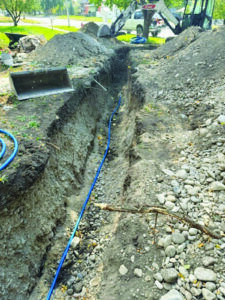
by Nathan Boddy
Residents of the City of Hamilton have had an opportunity presented to them through mailers and bills from the city. The supplemental insurance company, Service Lines Warranty of America (SLWA), offers residential properties an opportunity to insure their private utility water and sewer lines from costly repair.
It is critical to understand that not all underground utility lines are the responsibility of the City of Hamilton. In general, a public water main brings residential water to a home’s meter, where it is controlled and measured by city public works. In many cases, that meter lies somewhere near the property boundary. All the pipes on the ‘downstream’ side of that meter and into the home are the sole responsibility of the home owner. The same is true with drain lines: from the sink or toilet all the way to the point where the pipe joins the public sewer line beneath the street or alley, it is the responsibility of the home owner.
The cost of any damage repair, from intrusion of tree roots, pin-hole leaks, freezing pipes, subsidence of ground, etc. is borne by the home owner, not the City of Hamilton. This is an important point in a city where many of the underground private service lines are aging and susceptible to leakage or even catastrophic breaks.
In 2023, the City of Hamilton was approached by SLWA, an affiliate of HomeServe, a multinational home emergency repair business based in the U.K. SLWA functions in partnership with the National League of Cities in order to offer supplemental insurance to residents of partner cities and municipalities. After review, the Public Works Department brought the proposal to the Hamilton City Council on April 16th of this year, where it heard a brief presentation by HomeServe’s Regional Director for Montana, Dennis Lyon, who dialed into the meeting to explain the partnership SLWA was proposing.
 “The purpose of our program is that homeowners are frequently unaware of what their lateral line responsibilities are,” said Lyon. “So, our program proactively educates them while providing low-cost solutions that they can voluntarily participate in, that they can opt in or out of at any time. There’s absolutely no cost to the City, and HomeServe administers the program completely. That means the marketing, the billing, the customer service claims, and even contractor vetting and management, which is important. The plans that we offer contain no deductible, no service fee, no annual or lifetime limits, and also there’s no inspection of a property for a homeowner that chooses to participate. Their coverage begins 30 days after they’ve enrolled. We handle all the claims from beginning to end, including paying the local contractor directly once the work is complete.”
“The purpose of our program is that homeowners are frequently unaware of what their lateral line responsibilities are,” said Lyon. “So, our program proactively educates them while providing low-cost solutions that they can voluntarily participate in, that they can opt in or out of at any time. There’s absolutely no cost to the City, and HomeServe administers the program completely. That means the marketing, the billing, the customer service claims, and even contractor vetting and management, which is important. The plans that we offer contain no deductible, no service fee, no annual or lifetime limits, and also there’s no inspection of a property for a homeowner that chooses to participate. Their coverage begins 30 days after they’ve enrolled. We handle all the claims from beginning to end, including paying the local contractor directly once the work is complete.”
After a series of questions and deliberation, the Hamilton City Council voted to enter into a limited partnership with SLWA. The arrangement specifies that SLWA will have access to promote its insurance products through the city’s website and on city mailers. While some municipalities accept a 10% revenue sharing from each of the accounts that is generated from this joint outreach, the City Council of Hamilton opted instead to defer that payment in favor of SLWA passing an additional $.50 savings onto each of the residential accounts generated. The City of Hamilton receives no money from SLWA, either directly or indirectly, from purchased insurance packages.
According to Hamilton Mayor Dominic Farrenkopf, there may be a benefit to the City when residents purchase the insurance plan insofar as claimants would address their service line problems and repairs directly through SLWA. The City of Hamilton, who does not have responsibility for lateral lines, may be spared significant staff time in addressing questions and issues. According to reporting done by David Lazarus of the LA Times, who also reviewed an agreement between the City of Los Angeles and SLWA, citizens have a variety of ways to protect themselves from costly repairs to service lines, which include routine annual maintenance, camera inspections of sewer lines, or supplemental insurance from their regular home insurance which may be available upon request.
Ultimately, even though the City does allow SLWA to market itself via city channels (there is currently a link to SLWA on the city’s internet home page), Farrenkopf asserts that citizens need to educate themselves as to their obligations and whether their current home insurance policy may or may not cover problems with their lateral lines.
“You don’t have a choice as to who owns the infrastructure or who’s responsible for it, but you do have the choice to insure it,” said Farrejkopf. “What the city council wants to do is educate people, just learn who owns that infrastructure.”